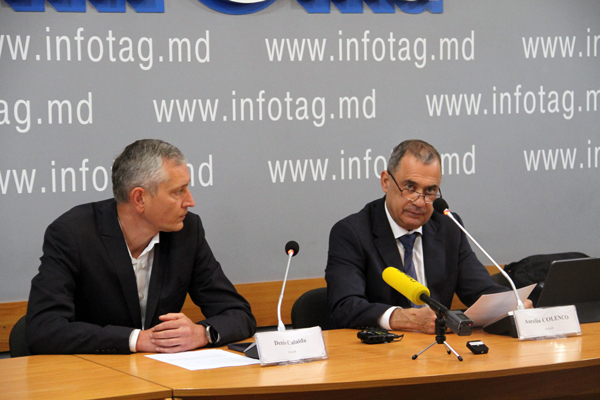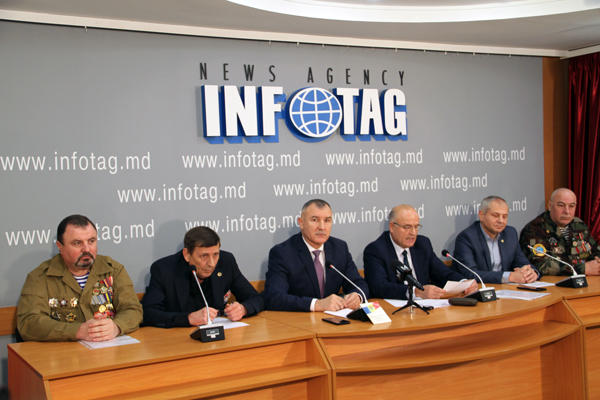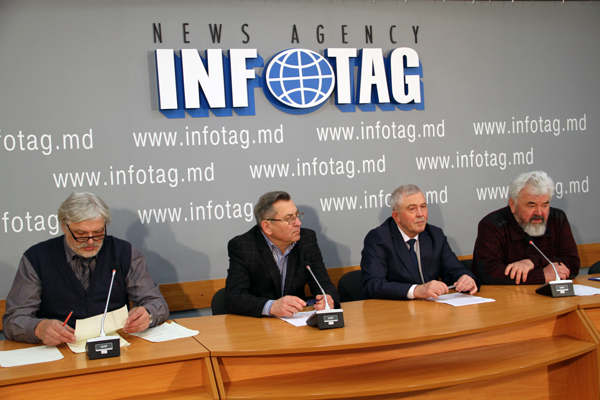Interview
MICB CONSULTS WITH WESTERN BANK ABOUT STRATEGIC INVESTOR ATTRACTING

Moldindconbank (MICB) shareholders are ready to transfer the control of the bank to a strategic investor they are seeking with the assistance of a consultant in the face of a west-European bank. In an interview to Infotag Director Alexandru Tanas, MICB Deputy Chairman Victor Cibotaru tells about the situation in the bank, about management and policy issues, aimed at ensuring stability and dynamic development.
Part 1. MICB special subdivision is analyzing risks of future periods
Q: Mr. Cibotaru, coming to the Moldindconbank for the second time, can you compare how was the regulator control back then and how it is now? Did it change, become different?
A: Since then, the requirements to the banking system grew many-fold. If, for example, taking into account the prudential norms, demands to the capital adequacy, risks of information disclosure, this is a completely different bank. Today, the so called compliance departments, who are responsible for risks management, are the main departments in modern banks.
Q: Is it not the credit department the most important?
A: No. A deep analysis and calculating risks of clients and of all the procedures within the institution is more important nowadays. This is why the MICB, which wants to be stable and to dynamically develop, should have all this in its policy. We are the second bank in Moldova, where such a special division was created. Its main goal is to carefully supervise the internal processes and analyze as deeply as possible various risks the bank may potentially face.
Q: In countries with developed economy, authorities resort to the policy of indulgences and mitigation, helping banks, ensuring them with additional liquidity. How relevant is this for Moldova?
A: They are not just helping, they literally are saving banks. In the moment when first cases of financial indulgence occurred, a set phrase appeared “too big to go bankrupt”. This phenomena has always been characteristic to financial markets, when countries are in a difficult situation, which pushes them to opt for taking a difficult decision about who and, what is more important, how to help.
Sometimes it is very difficult to make choice, which is not so wide – either to collapse the system or to agree to a so-called “soft variant”. Because, what is in fact that financial indulgence? It is the purchasing of securities of bank assets, which cannot find a customer in the market. On the other hand, such liquidity infusions in financial institutions have one important goal – to support banks in difficult periods, when the situation in economy gets worse, due to which many economic agents face difficulties in production and selling, which influences on fulfilling of liabilities to the crediting bank.
Q: In crises, everything shrinks, in such moments it is almost impossible to sell anything.
A: When the economy is growing – the market belongs to seller, while when it is falling – the time of buyer comes. When a buyer with money comes to the market, he is surrounded by sellers, ready to sell him assets. In any case, this working strategy is much less risky than having issuers’ securities, which mean just inscriptions on accounts. Thus, any credit in a Moldovan bank, if it was not issue with gross violation of regulation, has a pledge. If talking about our bank, the absolute majority of our loans are classified as working credits.
Q: How do you assess the state of banking sector of Moldova, to which external partners’ attention is focused, especially of the International Monetary Fund and the World Bank.
A: In 2015, the Moldovan economy got on the verge of recession, when the GDP decline accounted for 0.5%, though, in the first half-year it registered 4.5% growth. Plus to this, this growth cannot be considered purely economic, as it was achieved due to the financial component, formed by the considerable depreciation of the national currency.
I have already been adherent to the fact that we in Moldova cannot rely on economic growth at the expense of the Moldovan leu rate. The country should have a relative stability of national currency rate, which is successfully fulfilled by the NBM lately. It is clear that banks are directly dependent on the situation in the market. Back 2 years ago, the crediting was quite high, while today the growth has sharply shrunk, its rate is straight linear: the amount of credits we are issuing comes back to us almost in full. This is due to the situation in economy, relations and reaction of people to crisis. A person takes credit either for investments for the future long-term period, or for the working capital under a short-term demand. Currently, the market registers neither the first, nor the second. (Interview will be continued later today)
Part 2. The rescue of a drowning man is the drowning man’s own job
Q: The accessibility of financing, time frames, costs are important for the business in this situation.
A: Yes, these have an important role also, as interest rates on credits grew strongly since mid-2015. Before this increment, they were within 11-12%, but starting from August, the process of growth started, when their average rate reached 18-19%. All the market participants understand the reasons of such growth – the toughening of monetary policy, which occurred so fast that could not be even analyzed. The required reserve ratio grew up till 35%, when each third leu is being deposited by banks in the NBM. The base rate, on which banks could be placed in the NBM, accounted for 19.5%, while the yield of finance Ministry’s securities reached 26% and even higher.
Now, the situation is developing in the different side – improvement and favors to the business. The National Bank of Moldova (NBM) has reduced the base rate already for the fourth time, though it does not touch the required reserves. I suppose this is due to the fact that it wants to thoroughly convince where the situation is moving, whether the economy and economic agents are really getting healthier. I think that the NBM will reduce the reservation only when it sees that banks needs credit resources. However, so far we do not register demand.
Q: Given the Moldovan financial market isolation, is the indulgence so necessary, when banks and their clients encounter difficulties due to the decline in economy, consumption, imports and exports?
A: I would say that the rescue of a drowning man is the drowning man’s own job. I know it sounds cruelly, but this is the truth. The NBM’s role should consist of ensuring permanent supervision of the market and readiness in any moment to immediately intervene in the situation when the regulator considers that something is going wrong.
Q: Based on your experience, whether it is only the situation in economy that causes to clients the symptoms of sagging, when they fail to comply with the schedule of repaying interest rates and the body of credit?
A: On the basis of my personal experience and the experience as a banker and industrialists, I think that problems in the business appear when its owners or managers do not reckon their forces and possibilities, really overestimating these, which is demonstrated at appearance of first, small and insignificant problems. It is understandable that everyone wants to develop faster and earn more. But when people start to spend the working capital on investments without any calculation or risk analysis, in the best case building new production facilities or installing modern expensive lines, while in the worst case, buying luxurious houses and expensive cars, they are inevitably risking to get financial problems.
I would add that the demand, for example, never collapses instantly. Dinosaurs became extinct not within a year. The climate is changing slowly, thus all those, who adapt to changes, usually survive. While those, who do not do this, they die. And this rule concerns all the types of activity. In any type of occupation it is very important to sell a part of money for analyzing of what is happening within enterprises, bank, country, region, in order to make correct conclusions at take important decisions.
Q: You are deliberately evading answering the question about the regulator’s indulgence policy.
A: At any force-majeure situation it would be great if the state or its institutions to intervene in the situation and really help. But such assistance should be considered through the prism of state opportunities. Generally speaking, the state is a kind of mutual aid fund. If nobody invests money in it, but only takes, there is no chance to get assistance. The state has specific functions and they should not consist of helping a person, who bought a Mercedes or a comfortable house, but left the personnel without salaries. As a rule, all those, who are relying on their business and work for taking into account all the possible risks, do not get into a bad situation abruptly. The state assistance to economic agents is not a priority and first need and it is not the state’s guilt.
Q: What can you say about the diagnostics in Moldindconbank, which was also conducted in other two major country’s banks?
A: Two-thirds of the market accounts for these three banks. International financial institutions’ recommendation about the advisability of conducting diagnostics in these banks after the money withdrawing from three liquidated banks, may be characterized by means of a well-known saying: a scalded cat fears cold water.
The banking system does not like nonprofessional bustle around it. In fact, it is National Bank of Moldova and investigating bodies, specialists and professionals who have to engage in solving the situation with three banks. While when anyone who feels like it, starts to analyze it, diagnosing the banking system in general and separate banks in particular, this is not well. Any economic agent, especially a bank, is sensibly reacting or even suffering, when the information attack is being conducted against him.
Unfortunately, none of those, who are delivering such hasty diagnoses to banks and the banking system, does not take into account its main rates and parameters. If analyzing these, there is no doubt that the Moldovan banking system is healthy. What I mean here first of all is the capital adequacy: if a bank has enough personal resources to cover its own losses in future.
Part 3. Bank liquidity twice exceeds market regulator normative
Q: Do banks have enough personal resources to cover their own losses in future?
A: If we look at these indexes in Moldovan banks, all of them have capital adequacy rate over 20%, though the normative of this important index, established by the NBM, accounts for 16%. Currently, there is no single point of view about capital adequacy rate. For example, the today’s requirements to it from the Basel Committee are 8%. But in times of crisis many banks in Europe had the capital adequacy at the level of 4-5%.
One more important moment is the rate of liquidity in the banking system. Currently, it exceeds 40% at the NBM regulation of 20%, while according to international norms this rate is even lower. However, authors of doubtful diagnosis keep making long ambitious conclusions, without bothering to find justifications, the fact that misleads many people even more.
Here, another aspect of the problem is important. We understand that the market sagged. This is why the bank applies extremely conservative policy in relation to risk assessment. Currently, we are assessing our possible losses, forming a good safety cushion just in case. Almost all the earned profit is spent for this purpose. The fund of risk we are forming in our bank at the expense of profit, represents an important and necessary buffer for MICB. We understand very well that at any unpredictable hit, it will allow mitigating its consequences.
Q: The Moldindconbank Executive Board is seeking a strategic investor, when the situation on the market is not the most favorable for this; as you said it is the time of buyers, but not of sellers. The bank is pushed to this by the situation or it is a planned implementation of the MICB owners’ strategy?
A: The Moldovan banking system was formed in two directions – on the basis of the already existing banks and the newly established financial institutions in the country. With all this, the bank’s capital grows at the expense of non-distributed profit and new issues of shares, which usually were purchased by economic agents, who were bank clients, partially – by physical persons, as well as non-residents from near abroad. External partners do not speak about this directly, but make it clear how shareholders should be today and whether they can be accepted.
Now the issue is that all the shareholders should be accepted by the market regulator, regardless of their share in the bank capital. It is regarded as desirable and very acceptable that shares of the so-called non-institutional shareholders, who actively participated in Moldovan banks development at first time, to be transferred to Europe’s large bank structures, international financial organizations or investment funds. I think that presenting and understanding such perspective, MICB owners came to the conclusion about the expediency of seeking a strategic investor for the MICB.
Q: How should it be done?
A: There are two ways of action: either a group of shareholders forms a controlling package of shares and sells it to a major western bank, or the MICB owners decide to conduct an additional shares issue, intended for its selling to an investment fund or a foreign bank, for example.
Q: But you said it is the time of buyers on the market.
A: Yes, it is and Moldindconbank shareholders understand it also. But this does not mean that the search for investor should be stopped for this period. Today the market is weak, but everything changes and tomorrow the Moldovan bank will become stronger that is more attractive for investors. Namely with a view to improvement of the situation in Moldovan economy, we currently are closely working with several authority financial institutions from the Western Europe. We are conducting negotiations that they to take the role of financial consultants in selling MICB controlling package, or to come to the bank by themselves. In parallel, we are going to conduct a personal audit diagnostics to establish the real cost of its assets.
In this time interval, MICB managers face two important issues. The first consists of seeking financial consultant for attracting investor for MICB. The second – to conduct diagnostics and assess the bank’s price, which will show the level of quality of this asset. I do not exclude that on the basis of the diagnostics’ results we will prepare a special plan, the implementation of which will help improving the asset quality, which will positively affect the bank’s price.
























Add Comment